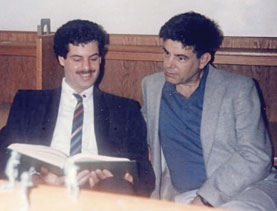Jonathan D. Wirtschafter ’56

Jonathan Wirtschafter ’56 (right) visits with his son Benjamin Wirtschafter ’86.
Jonathan D. Wirtschafter ’56, August 11, 2004, in Minneapolis, Minnesota, from Lou Gehrig’s disease. Jonathan received a BA in chemistry from Reed and an MD from Harvard in 1960. That same year, he married Carol Lavenstein. In 1962, he earned an MS in physiology from Linfield College, and did residencies at Good Samaritan Hospital in Portland, and at the Wilmer Institute of Johns Hopkins Hospital in Baltimore, Maryland; he was a fellow at Columbia Presbyterian Hospital in New York City. Jonathan began the resident training program, and was the first chair of the department of ophthalmology at the University of Kentucky Medical Center. During academic year 1973–74, he took sabbatical leave with his wife and five children, traveling throughout Europe in a Volkswagen bus. At the outbreak of the Yom Kippur War, he spent three weeks working the night shift at a Jerusalem hospital providing his services to all wounded, regardless of nationality. In 1977, he left Kentucky for a position at the University of Minnesota, and was Frank E. Burch Professor of Ophthalmology (neurology and neurosurgery) at the university for 25 years, 23 years as director of neuro-ophthalmology service. He was attending ophthalmologist at the University of Minnesota Twin Cities Campus, Mount Sinai Hospital, and the Metropolitan Medical Center in Minneapolis. In 1980, he received the American Academy of Ophthalmology’s honor award for outstanding service to the profession. Jonathan once wrote that he loved teaching and that Reed provided excellent models for almost everything he did. He was honored as the favorite teacher by residents four times, and sought opportunities to share his knowledge not only with his associates but also with his children, to whom he was devoted. Jonathan notably practiced the larger application of medicine, treating the needs of the whole individual, in addition to specific concerns. His unparalleled and sincere respect for others earned him a great following. Identified as an incredibly caring and humanistic man, Jonathan tested doxorubicin—approved for use on patients suffering from blepharospasm—by injecting himself in a trial use in 1988. He was founder and first president of a research foundation for blepharospasm, and was inducted into the foundation’s hall of fame in 1997. Professional associations included membership in Alpha Omega Alpha medical honor society, the Minnesota Academy of Ophthalmology and Otolaryngology, the Minnesota Medical Association, and the Association for the Advancement of Medical Instrumentation. He published many articles in professional journals, contributed to textbooks on ophthalmology, and was a member of the editorial board of Perspectives in Ophthalmology. A popular lecturer, Jonathan spoke at universities and organizations in numerous states and abroad. He created teaching aids for ophthalmologists, and did research work with grants from the National Institutes of Health and Fight for Sight. He was also a member of subcommittee on continuing education through television of the American Academy of Ophthalmology, and was an active member of Reed’s alumni association. In 2001, Jonathan took a half-time retirement, working in research for the university, and also living in Lake Tahoe, in order to visit his California grandchildren. Survivors include his wife, four sons, including Benjamin Z. Wirtschafter ’86, a daughter, and 10 grandchildren.
Appeared in Reed magazine: February 2005
comments powered by Disqus


![Photo of Prof. Marvin Levich [philosophy 1953–94]](https://www.reed.edu/reed-magazine/in-memoriam/assets/images/2022/LTL-levich1.jpg)
![Photo of President Paul E. Bragdon [1971–88]](https://www.reed.edu/reed-magazine/in-memoriam/assets/images/2020/Bragdon.jpg)
![Photo of Prof. Edward Barton Segel [history 1973–2011]](https://www.reed.edu/reed-magazine/in-memoriam/assets/images/2020/Segel.jpg)








































































